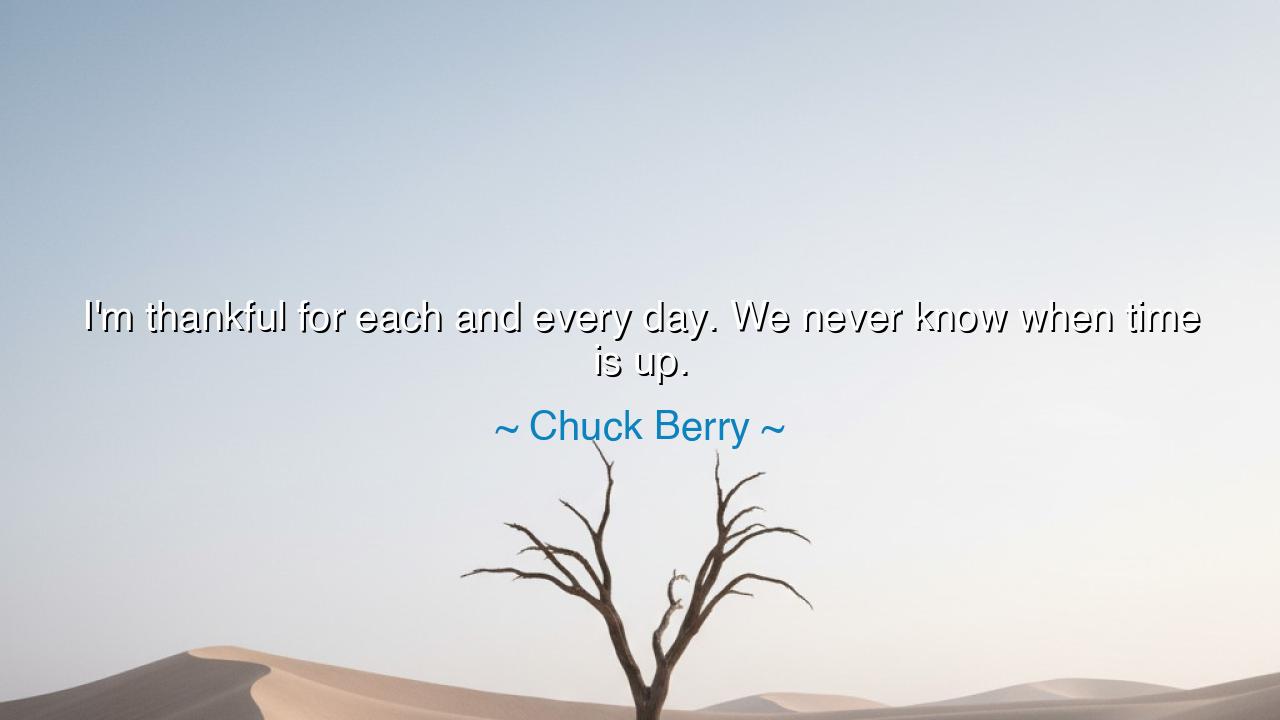
I'm thankful for each and every day. We never know when time is






Hear the voice of Chuck Berry, pioneer of sound and spirit, who once proclaimed: “I’m thankful for each and every day. We never know when time is up.” This is no casual saying, but a cry of wisdom born of experience. In his words lies the eternal truth that life is fragile, a candle burning against the winds of fate, and that to awaken each morning is itself a victory. Gratitude, therefore, is not reserved for wealth, fame, or triumph, but for the very breath within our lungs and the fleeting gift of another dawn.
The ancients knew well the brevity of existence. The Stoics whispered memento mori—remember you must die—not to cast men into despair, but to awaken them to the richness of the present. Chuck Berry’s words carry the same spirit. To be thankful for each day is to resist the illusion of permanence, to look upon the hours not as a given, but as a treasure. He reminds us that time is a master we cannot bargain with, and that to live without gratitude is to waste the most precious currency we will ever hold.
Consider the fall of Pompeii, when Mount Vesuvius erupted without warning. In a single day, lives were extinguished, homes buried, futures lost. Those who perished had no chance to prepare, no farewell to utter. This tragedy is a mirror to Berry’s teaching: “We never know when time is up.” Just as the people of Pompeii were caught in sudden darkness, so too may any life end without herald. And so the wise do not wait until tomorrow to live with thankfulness; they seize today as though it were their last.
Berry himself lived through trials that gave weight to his words—struggles of fame, hardship, and redemption. Yet in the twilight of his years, he did not speak of regrets, but of gratitude. Such words, uttered by one who walked through storms, remind us that thankfulness is not the privilege of the comfortable, but the strength of the tested. When he says he is thankful for each day, he speaks as one who knows the fragility of joy, and thus savors it all the more.
There is heroism in this attitude. Many curse the shortness of life, lamenting that time slips away like sand through the fingers. But Berry transforms this truth into power: knowing that the hourglass is finite, he treasures each grain as it falls. This is the way of the wise—turning mortality from a chain into a torch, using it to illuminate the value of each passing moment. Gratitude is not denial of death, but the art of living fully in its shadow.
The lesson is clear: be thankful not only for grand achievements, but for the simple miracle of another sunrise. Do not take for granted the food before you, the laughter of friends, the strength of your body, the chance to breathe. For one day, without warning, the last dawn will come, and no man knows when. Better, then, to live each day as a completed gift, than to waste it waiting for tomorrows that may never arrive.
Practical wisdom calls to you: each morning, pause and give thanks for the day before you. Each evening, reflect on the hours granted and the blessings within them. Speak gratitude aloud to those you love, for the moment may come when words can no longer be spoken. Do not wait to cherish what you already hold. In this way, you will walk in Berry’s wisdom: living with open eyes, open hands, and a heart that treasures each fleeting breath.
Thus, in the words of Chuck Berry, let us hear the ancient teaching renewed: that life is short, time is fragile, and gratitude is the only way to live it rightly. The one who is thankful for each day shall not be surprised by death, for he has lived fully, richly, and well. And when his time is up, he will not depart in regret, but with the peace of one who knew the value of every moment.






AAdministratorAdministrator
Welcome, honored guests. Please leave a comment, we will respond soon